While worldwide EV adoption grows month-over-month, many of the previous practices surrounding new and used vehicles will need to adapt to stay relevant. EVs are exceedingly different from ICE cars and require a keen focus on the vehicle’s battery as a crucial indicator of its overall health and longevity. Recurrent looks to bridge that gap for both current and prospective EV owners by using individual EV battery data and comparing that data to that of similar vehicles on the road. This technology has the potential to become the standard for understanding and benchmarking an EV’s battery.
Table of contents
EVs are different and should be treated as such
While EVs still only account for a small percentage of total vehicles on roads globally, their impact on the market is growing at an impressive rate.
Seemingly destined to become the new standard in transportation, electric vehicles come with their own unique components, key terms, and maintenance standards. For instance, traditional combustion engines consist of thousands of separate parts, while electric vehicle components exist in dozens.
Minimal components are ideal for less maintenance and fewer opportunities for malfunction, but the most invaluable piece of any electric vehicle is its battery pack. Ensuring it’s performing at its most efficient level is vital.
Any current EV owner will tell you that their car’s dashboard gives an estimated range that can be flawed by a number of factors. As EV adoption treks forward, we require more transparency toward our EV batteries.
Enter Recurrent – a new data tool that not only helps you monitor your own EV battery, but can also give you a full report on a previously used battery before you decide to purchase the EV housing it.
Introducing Recurrent
Recurrent is an EV battery monitoring tool that utilizes advanced machine learning to share performance data of a given vehicle compared to similar EVs in the system.
By using data from its ever-growing user base, Recurrent is able to generate multiple types of EV battery reports to suit different needs of current or prospective owners.
Recurrent’s mission is to expedite the public’s transition to electric vehicles by providing confidence through data for people who buy and sell used EVs.
Battery health itself is quite subjective based on a number of outside factors, and cannot be monitored with a one-size-fits-all approach.
That being said, Recurrent’s goal is to simply open people’s minds to the idea of buying a used EV, by giving them the tools to answer their own battery questions before they make their purchase.
The company looks to answer three of the most common questions from people venturing into EVs:
- What is the actual, real-world battery range?
- How will that change in different conditions, like summer or winter?
- And what will that range be three years from now?
Questions like these can all be answered using one of several reports currently at your disposal as a Recurrent member. Here’s how they break down.
Monthly EV battery health reports
Monthly reports from Recurrent exist as a free tool with multiple utilities for current EV owners. By registering your vehicle using its VIN or license plate number, you can see your individual EV data through Recurrent in a few easy steps.
This monthly report is generated using daily data from your vehicle as you use it, and compares it to thousands of other vehicles in the Recurrent system. The result is a side-by-side comparison of how your EV’s battery is performing against similar EVs in the same category.
This report could prove beneficial in monitoring your EV range each month, becoming more conscious of fluctuations or sudden decreases in range. From there, you can be better equipped to make adjustments to your EV’s charging hygiene and driving practices to preserve your battery.
Additionally, the monthly report allows you to track your EV battery throughout ownership to help determine when it might be the best time to sell in order to get the most value for your EV.
As an additional tool, you can provide evidence of the value of your EV and the state of its battery to any prospective buyer by comparing it to similar vehicles through Recurrent.
Are you leasing your EV? Recurrent is still available to you and your EV for free to track your battery performance during your lease terms. From there, you can decide whether it may be worth it to purchase our EV at the end of your lease or move onto a different model. Check out a sample report below.
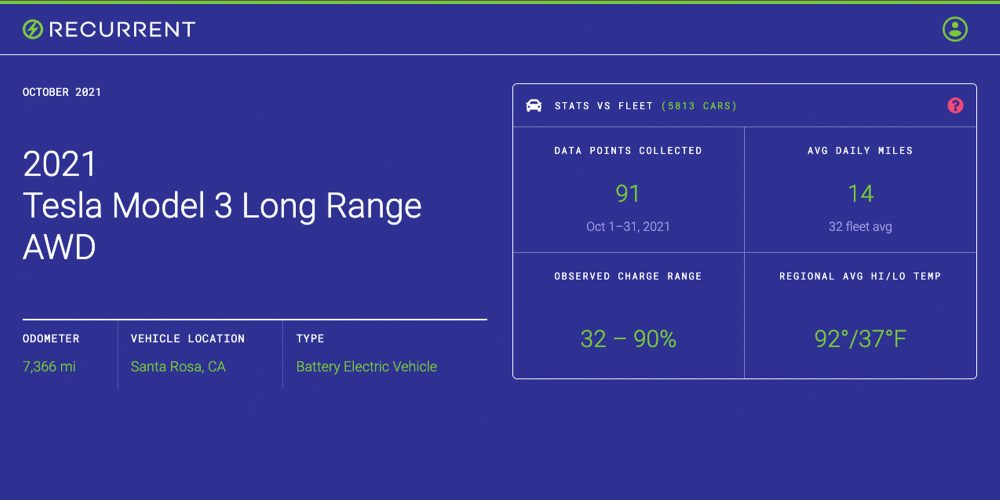
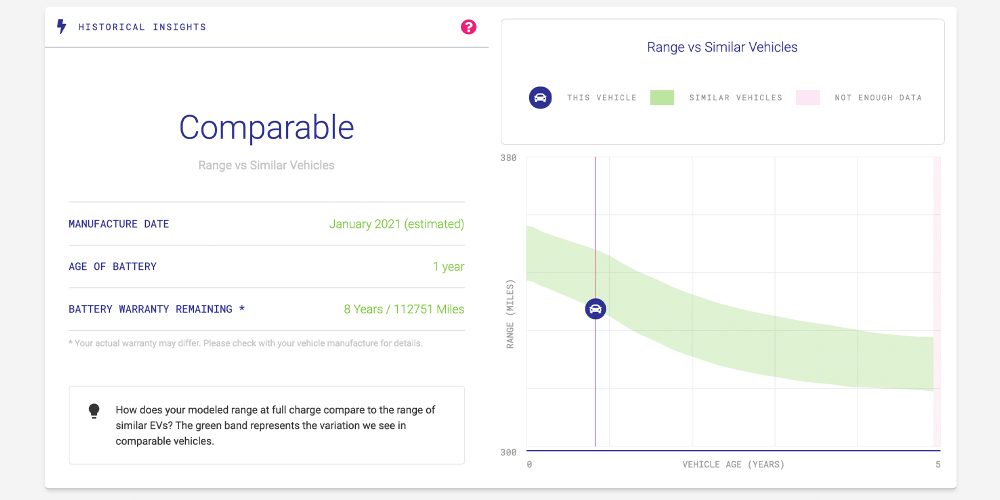

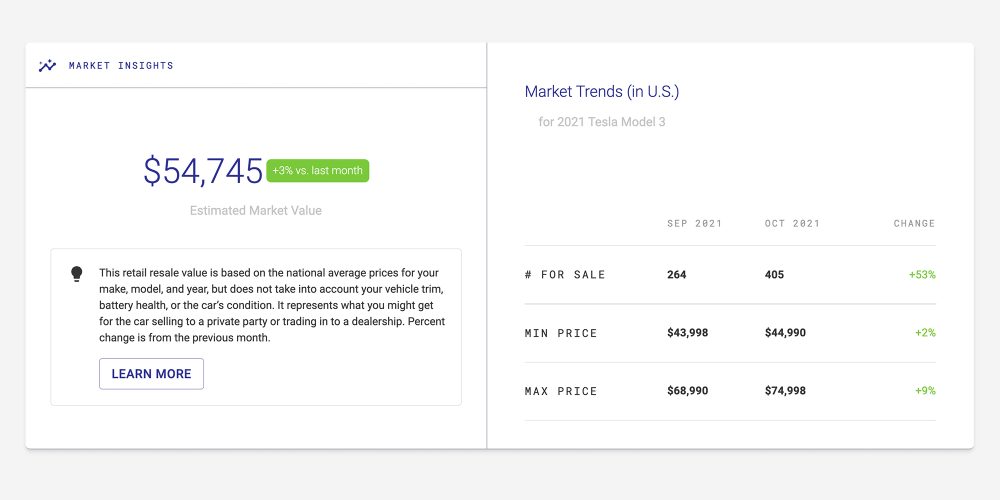
One-time EV battery health reports
Looking to purchase a used EV? As the market continues to grow, more and more people are selling their previous EVs and upgrading to the latest model. This leaves a new segment of used vehicles that shoppers (especially those looking to get a deal on their first ever EV) can take advantage of.
That being said, many consumers remain curious (as they should) about an EV’s battery, and how long it will actually last them after they purchase a used car.
Luckily, Recurrent’s free one-time report is perfect for EV shoppers looking to ensure they get the most range for their dollar.
By setting up a report through Recurrent using a prospective EV’s VIN or license plate number, shoppers can get a one-time report on the EV, then compare it against similar vehicles.
The one-time shopper report gives the EV a range rating, then projects what sort of range the vehicle will offer over the next three years.
Although the range data in the reports is displayed on a map, don’t worry. Recurrent does not collect any GPS data to ensure member privacy. The map is instead generated using the zip code you provide to start. Recurrent then uses that zip to evaluate the climate impacts facing your EV’s battery and range.
Lastly, the report lets you know if the EV battery you’re considering is still under warranty, and how it compares to similar EVs in the Recurrent community (see below).
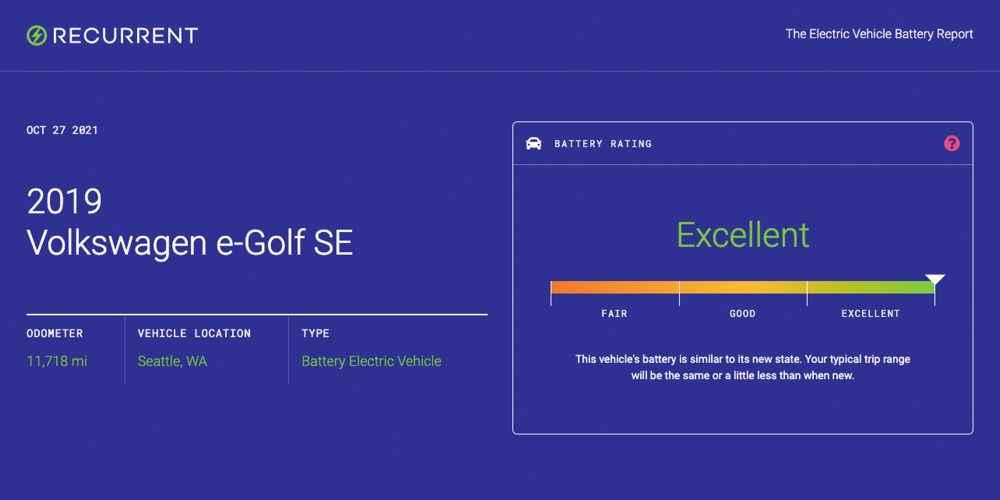
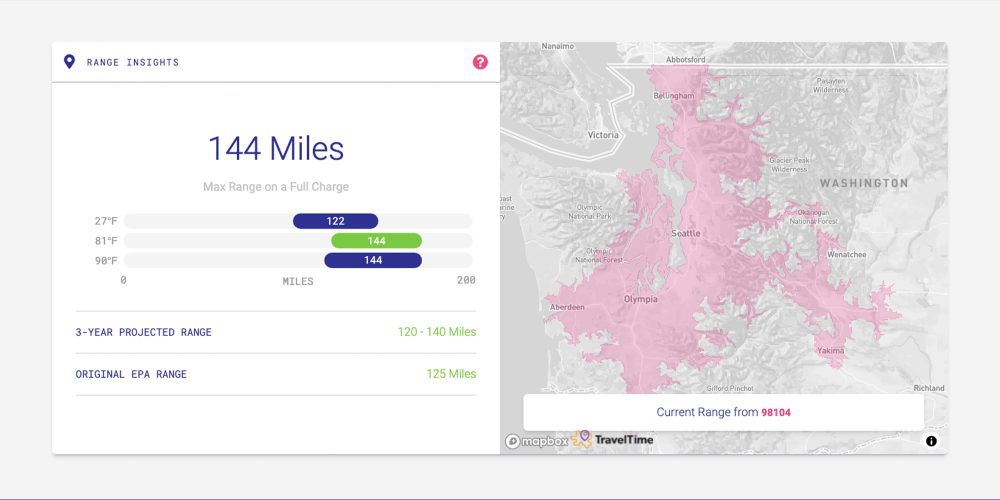
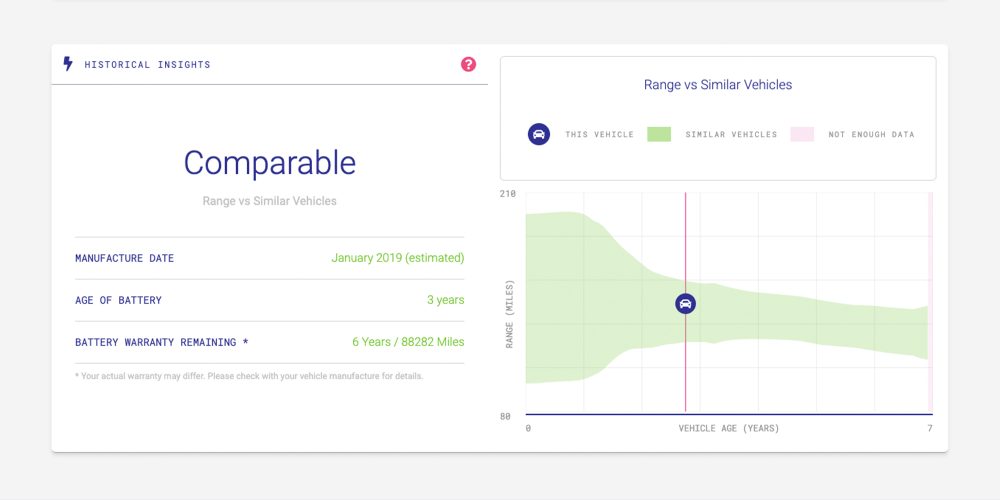
Dealership reports
The last report option currently available from Recurrent was designed specifically for vehicle dealerships rather than consumers.
Dealership reports are the only paid product from Recurrent and can be used as a viable tool for business owners to track their inventory. The dealership report platform allows EV dealers to run bulk reports of all the cars on their lot, thus consistently monitoring EV batteries and value.
That data is also absorbed into the overall Recurrent pool for individual owners and shoppers to utilize through future and more precise comparisons.
Dealership reports are a simplified, public-facing version of Recurrent’s one-time reports that can be showcased by dealership customers on their own EV sales sites. Notice the green Recurrent icon on the used EV page below.
The Recurrent icon is always clickable and will provide the battery report to potential buyers to ensure both parties are aware of a given EV’s battery report. This can aid both the seller and buyer to agree on a fair price.
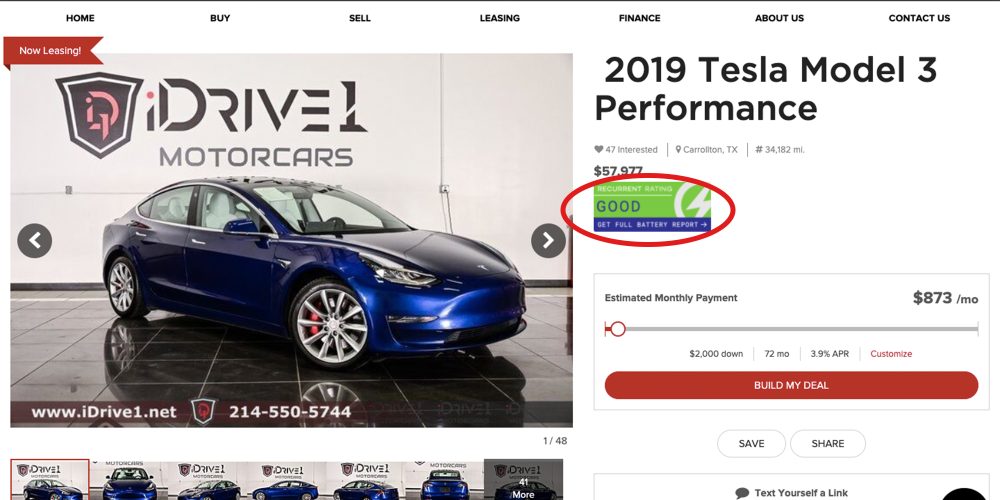
Try out Recurrent for yourself for free
Whether you own an EV or have a specific one in mind for a used purchase, Recurrent is a helpful free tool you should be sure to check out.
If you’re an owner, you can register your EV for monthly reports, and gain insight into how to get the most out of your EV battery. Furthermore, you may find yourself more savvy as to when might be an ideal time to sell your EV.
If you’re looking to purchase a used EV, it wouldn’t hurt to run its VIN through Recurrent’s free one-time report, to see what sort of battery really lies within that vehicle. Remember, the estimated mileage on the dashboard isn’t always accurate.
Subscribe to Electrek on YouTube for exclusive videos and subscribe to the podcast.























